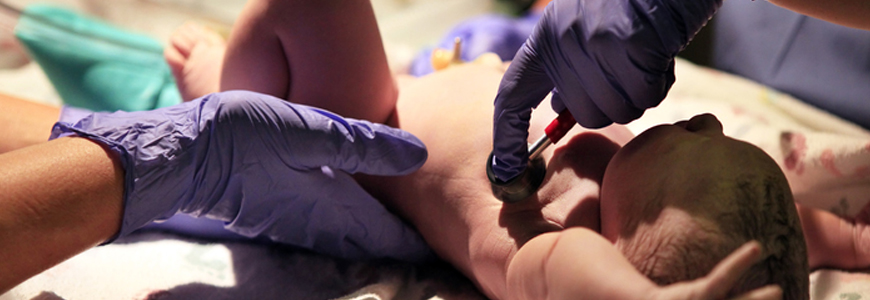Duke’s level 4 Intensive Care Nursery (ICN) admits approximately 30 infants annually with moderate to severe hypoxic-ischemic encephalopathy, and up to 50 with serious congenital heart disease that will require surgery. Many of the infants with congenital heart disease are also born prematurely. New partnerships among neonatologists, neurologists, and cardiologists are enabling a multidisciplinary approach to their care and resulting in improved outcomes for these at-risk children.
“These infants need to be well-cared for across the institution—from perinatal and neonatal stages and throughout their lives after they go home—and that has ramped up the need for us to collaborate across disciplines, enhance our skills, and implement new programs,” says C. Michael Cotten, MD, MHS, a Duke neonatologist.
Units within the unit
Collaborative work on a Neuro-Intensive Care Nursery (N-ICN) started in 2016 and a Cardiac Intensive Care Nursery (C-ICN) in 2018. Duke is among the first ICNs in the U.S. to develop these ‘units within the unit’. Cotten says the Duke NICU is at the ‘tip of the spear’ when it comes to formally integrating pediatric neurology and cardiology with neonatology and providing extra-attentive care to babies with brain injuries, neurologic complications, and complex heart disease.
The N-ICN features continuous amplitude-integrated EEG to monitor the electrocortical activity in preterm and term infants with suspected brain injury at the bedside, enabling providers to make more timely diagnosis of seizures and quickly begin treatment.
The C-ICN optimizes diagnostic test and treatment decision-making during a critical time when extremely preterm infants with congenital heart disease need to reach an appropriate size for life-saving surgical interventions.
Networking
Networking provides another advantage in improving patient outcomes, particularly for very low birthweight (VLBW; less than 1,500 grams birthweight) infants. Since 2008, Duke’s ICN has been an active member of the Vermont Oxford Network (VON), a consortium of 1,300 ICNs that share outcomes and care practice data, especially for VLBW babies. “As part of our participation in VON we’ve acquired new skills and are taking leadership roles in important projects such as antibiotic stewardship, which has been an international focus in neonatology, and actually hospital-wide clinical practice,” Cotten says.
Cotten reports that the Duke ICN has consistently maintained high survival rates and one of the lowest rates of chronic lung disease among VLBW infants in the U.S., and has achieved reductions in a number of areas through quality improvement initiatives, including:
- Antibiotic use in pre-term babies
- Central line–associated bloodstream infections
- Medication mixing, dispensing, and dosing errors
Transitional programs
Duke’s internationally acclaimed quality-of-life service, led by Margarita Bidegain, MD, MHS-CL, a neonatologist and palliative medicine specialist, provides comfort care for the entire family when they face difficult diagnoses or come to terms with knowing interventions won’t change a negative outcome for their child.
For babies who are discharged with a technical dependence that requires special monitoring, a transitional medical home team stays deeply involved with families, providing 24/7 access to pediatricians from the Neonatology Division who have been involved in their baby’s care since their time in the ICN, helping coordinate care among subspecialists and avoid trips to the ED.
Special care clinics
The Special Infant Care Clinic provides post-discharge medical and neurodevelopmental assessments and interventions for high-risk babies. Physical and occupational therapists, social workers, advanced practice nurses, and clinicians are specially trained in convalescent, long-term care for children who have been cared for in the NICU.
The Neonatology Division recently partnered with faculty from Neurology, Cardiology, Psychiatry, and Psychology; physical, occupational, and speech therapists; dietitians; social workers; and nurse clinicians to initiate Duke’s first Pediatric Cardiac Neurodevelopmental Clinic to improve outcomes of infants born with complex congenital heart disease.
Best of the best
Cotten views the NICU as a place where people with diverse expertise, passion, energy, and imagination come together to find better and better ways of caring for babies. He describes this spirit of hard work and dedication to improving outcomes by recalling comments by the famous jazz band leader Jon Batiste. An interviewer asked who Batiste’s favorite composer was, and the answer was “Bach.” When the interviewer asked why he chose Bach, Batiste answered, “Because he was the best at being the best of the people who are being the best of the best.” For Cotten, in the care of vulnerable babies and their families, that’s what everyone in the Duke ICN strives to be every day.
